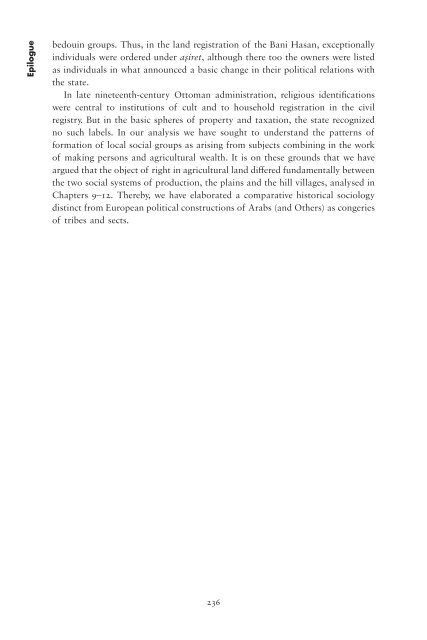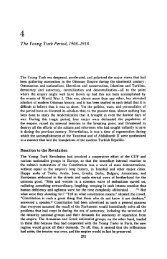- Page 2:
Governing property, making the mode
- Page 5 and 6:
Published in 2007 by I.B.Tauris & C
- Page 7 and 8:
6 The introduction of bureaucratic
- Page 9 and 10:
Maps, figures and tables Maps 5.1 T
- Page 11 and 12:
Note on transliteration, datation a
- Page 13 and 14:
Acknowledgements We have accumulate
- Page 16 and 17:
1 | Introduction Two documents On 1
- Page 18 and 19:
Legal doctrine here frames property
- Page 20 and 21:
The case occurred some five years a
- Page 22 and 23:
of first instance. 25 Only a few ye
- Page 24:
PART ONE | Ottoman jurisprudence co
- Page 27 and 28:
Part one | 2 remained fixed regardl
- Page 29 and 30:
Part one | 2 mülk land. The Ottoma
- Page 31 and 32:
Part one | 2 tax revenue the timari
- Page 33 and 34:
Part one | 2 only out of the necess
- Page 35 and 36:
Part one | 2 devolution of offices,
- Page 37 and 38:
Part one | 3 enjoy greater politica
- Page 39 and 40:
Part one | 3 equivalent of a grant
- Page 41 and 42:
Part one | 3 fetwa concerning a cul
- Page 43 and 44:
Part one | 3 Muhammad al-‘Imadi (
- Page 45 and 46:
Part one | 3 character of the culti
- Page 47 and 48:
Part one | 3 the provisions of the
- Page 49 and 50:
Part one | 3 others died creating a
- Page 51 and 52:
Part one | 3 is commended, forcible
- Page 53 and 54:
Part one | 3 criterion by which to
- Page 55 and 56:
4 | Legal reform from the 1830s to
- Page 57 and 58:
Part one | 4 administration require
- Page 59 and 60:
Part one | 4 prosecution of corrupt
- Page 61 and 62:
Part one | 4 together with the land
- Page 63 and 64:
Part one | 4 holders of miri land t
- Page 65 and 66:
Part one | 4 the Meclis-i Vala, con
- Page 67 and 68:
Part one | 4 were issued that marke
- Page 70 and 71:
Introduction The last chapter descr
- Page 72 and 73:
5 | Production and settlement in th
- Page 74 and 75:
Jordan River Lake Tiberias Kufrinja
- Page 76 and 77:
Jordan River Lake Tiberias Yarmuk R
- Page 78 and 79:
Jordan River Lake Tiberias Khirbat
- Page 80 and 81:
nahiye lie three further foothill v
- Page 82 and 83:
to the three districts of ‘Ajlun,
- Page 84 and 85:
Jordan River Lake Tiberias Yarmuk R
- Page 86 and 87:
in the second from 22 to 24; in the
- Page 88 and 89:
The complaint to Istanbul by the vi
- Page 90 and 91:
souls [i.e. those listed above], we
- Page 92 and 93:
estricted to plough agriculture of
- Page 94 and 95:
these villages to register land. Al
- Page 96 and 97:
eturned to Irbid they would be repa
- Page 98 and 99:
al-Fattah Efendi had come to the di
- Page 100 and 101:
After the series of sessions come i
- Page 102 and 103:
unacceptable acts: pretending to de
- Page 104 and 105:
Da’ud ‘Abbada and Jurji Qabawat
- Page 106 and 107:
which later was to be subdivided in
- Page 108 and 109:
in descending rank order by size in
- Page 110 and 111:
acking as tax collectors. Ibrahim E
- Page 112 and 113:
ecame standardized across large are
- Page 114 and 115:
villages to the large area of exten
- Page 116 and 117:
title document or, if it had been l
- Page 118:
Local political leaders came gradua
- Page 122 and 123:
Introduction Part three considers t
- Page 124 and 125:
shares in plough land in 1895 was a
- Page 126 and 127:
question of ‘Ajaj Bey, the govern
- Page 128 and 129:
1895 1921 1910 Holding House House
- Page 130 and 131:
1895 1921 1910 Holding House House
- Page 132 and 133:
marriage links by the mid-1890s wit
- Page 134 and 135:
holdings numbered 33 to 57) were no
- Page 136 and 137:
Figure 9.2 Bait Ra’s, households
- Page 138 and 139:
But it makes clear that the fight w
- Page 140 and 141:
in 1880, 1895 and 1921. The table
- Page 142 and 143:
Nineteenth-century Ottoman land ref
- Page 144 and 145:
Unsettledness: initial registration
- Page 146 and 147:
11 2 [Kirsanna] ‘Awwad ‘Abdul-R
- Page 148 and 149:
Figure 9.3 Hawwara, genealogy of th
- Page 150 and 151:
ecorded in the 1895 tax register. C
- Page 152 and 153:
which in 1895 had been held by Sali
- Page 154 and 155:
adjusted to entries in the tapu reg
- Page 156 and 157:
By 1895 the village had expanded in
- Page 158 and 159:
There was ambiguity in the nature o
- Page 160 and 161:
the three blocks of land seem to ha
- Page 162 and 163:
instance, one sub-group of eight sh
- Page 164 and 165:
ut would appear to have come togeth
- Page 166 and 167:
composed of the Haddad, Da’ud,
- Page 168 and 169:
with the formal division into secti
- Page 170 and 171:
affinal links. In a close-knit comm
- Page 172 and 173:
TABLE 10.1 Kufr ‘Awan, properties
- Page 174 and 175:
19c Hasan Sulaiman Fallah 678a 1/4
- Page 176 and 177:
householder or the holder of an oli
- Page 178 and 179:
egistration ‘Abdullah had no chil
- Page 180 and 181:
crop rotation and reallotment of ho
- Page 182 and 183:
payment. His case too is discussed
- Page 184 and 185:
Figure 10.3 Kufr `Awan, households
- Page 186 and 187:
Figure 10.5 Kufr `Awan, households
- Page 188 and 189:
on the other hand, there is an inhe
- Page 190 and 191:
1940). The other ¾q of Zarifa’s
- Page 192 and 193:
most valuable asset of villagers, l
- Page 194 and 195:
TABLE 10.2 Khanzira, share per pers
- Page 196 and 197:
olive trees; 215 plots were registe
- Page 198 and 199:
on another family’s land; and ano
- Page 200 and 201: to 31, and in 14 of the mutations t
- Page 202 and 203: plough animals and male labour. Cro
- Page 204 and 205: Figure 11.1 Tannash family holdings
- Page 206 and 207: nu‘mana as fodder. As a summer cr
- Page 208 and 209: It appears that at the time land wa
- Page 210 and 211: Figure 11.3 Marriage relations of t
- Page 212 and 213: substantial say in the control of l
- Page 214 and 215: atls of lentils, one-half ratl of s
- Page 216 and 217: had often moved once or twice comin
- Page 218 and 219: Figure 11.5 Gharaiba intermarriages
- Page 220 and 221: Figure 11.6 Ahmad `Abid-Rabbuh’s
- Page 222 and 223: Figure 11.7 Holdings of `Abdul-Ghan
- Page 224 and 225: exercised over crop rotation or the
- Page 226 and 227: Figure 12.1 Family links of Husna S
- Page 228 and 229: did he plough. This statement appea
- Page 230 and 231: Figure 12.2 Marriage links of Ahmad
- Page 232 and 233: each being registered as owning 1½
- Page 234 and 235: (‘urja) at her wedding. Her husba
- Page 236 and 237: Figure 12.4 The marriages of Ibrahi
- Page 238 and 239: notables (wujuh) Hasan al-Salim, Ib
- Page 240 and 241: Figure 12.5 The children of Sheikh
- Page 242 and 243: weeks under the tree, and eventuall
- Page 244 and 245: Figure 12.6 Family links of Yumna M
- Page 246: with almond-shaped openings, built
- Page 249: Epilogue eighteenth centuries the c
- Page 253 and 254: Notes to chapter 1 landholdings in
- Page 255 and 256: Notes to chapters 1 and 2 wa-jiwaru
- Page 257 and 258: Notes to chapter 2 nakl olunmaz; ta
- Page 259 and 260: Notes to chapters 2 and 3 question;
- Page 261 and 262: Notes to chapter 3 the muftis). The
- Page 263 and 264: Notes to chapter 3 cites Masters, T
- Page 265 and 266: Notes to chapter 3 Yahya Efendi - p
- Page 267 and 268: Notes to chapters 3 and 4 taxes imp
- Page 269 and 270: Notes to chapter 4 19 There is a di
- Page 271 and 272: Notes to chapter 4 enough to shelte
- Page 273 and 274: Notes to chapters 5 and 6 6 On the
- Page 275 and 276: Notes to chapter 6 the debt; the vi
- Page 277 and 278: Notes to chapters 6 and 7 to the pr
- Page 279 and 280: Notes to chapter 7 10 Later in the
- Page 281 and 282: Notes to chapter 7 36 BOA.ŞD.2273/
- Page 283 and 284: Notes to chapter 8 ent administrati
- Page 285 and 286: Notes to chapter 9 ing at that time
- Page 287 and 288: Notes to chapter 9 Hamid, Hamuda an
- Page 289 and 290: Notes to chapters 9 and 10 leaving
- Page 291 and 292: Notes to chapter 10 AT.Yoklama, Ağ
- Page 293 and 294: Notes to chapter 10 trees on villag
- Page 295 and 296: Notes to chapter 11 April 1927, con
- Page 297 and 298: Notes to chapter 11 and Mustafa al-
- Page 299 and 300: Notes to chapter 12 6 DLS.AT.Yoklam
- Page 301 and 302:
Notes to chapter 12 on 29 June and
- Page 303 and 304:
Notes to chapter 12 and Epilogue 61
- Page 305 and 306:
Bibliography the order of Emir Ibra
- Page 307 and 308:
Bibliography The Economic History o
- Page 309 and 310:
Bibliography Empire: Agrarian power
- Page 311 and 312:
Bibliography Peake, Frederik, Ta’
- Page 313 and 314:
Bibliography Near Eastern Studies,
- Page 315 and 316:
Index Bani Hasan, 57, 58, 65, 68, 8
- Page 317 and 318:
Index al-‘Imadi, Hamid ibn `Ali,
- Page 319 and 320:
Index orchards, as objects of regis
- Page 321:
Index temettuat, 42, 66 threshing,












